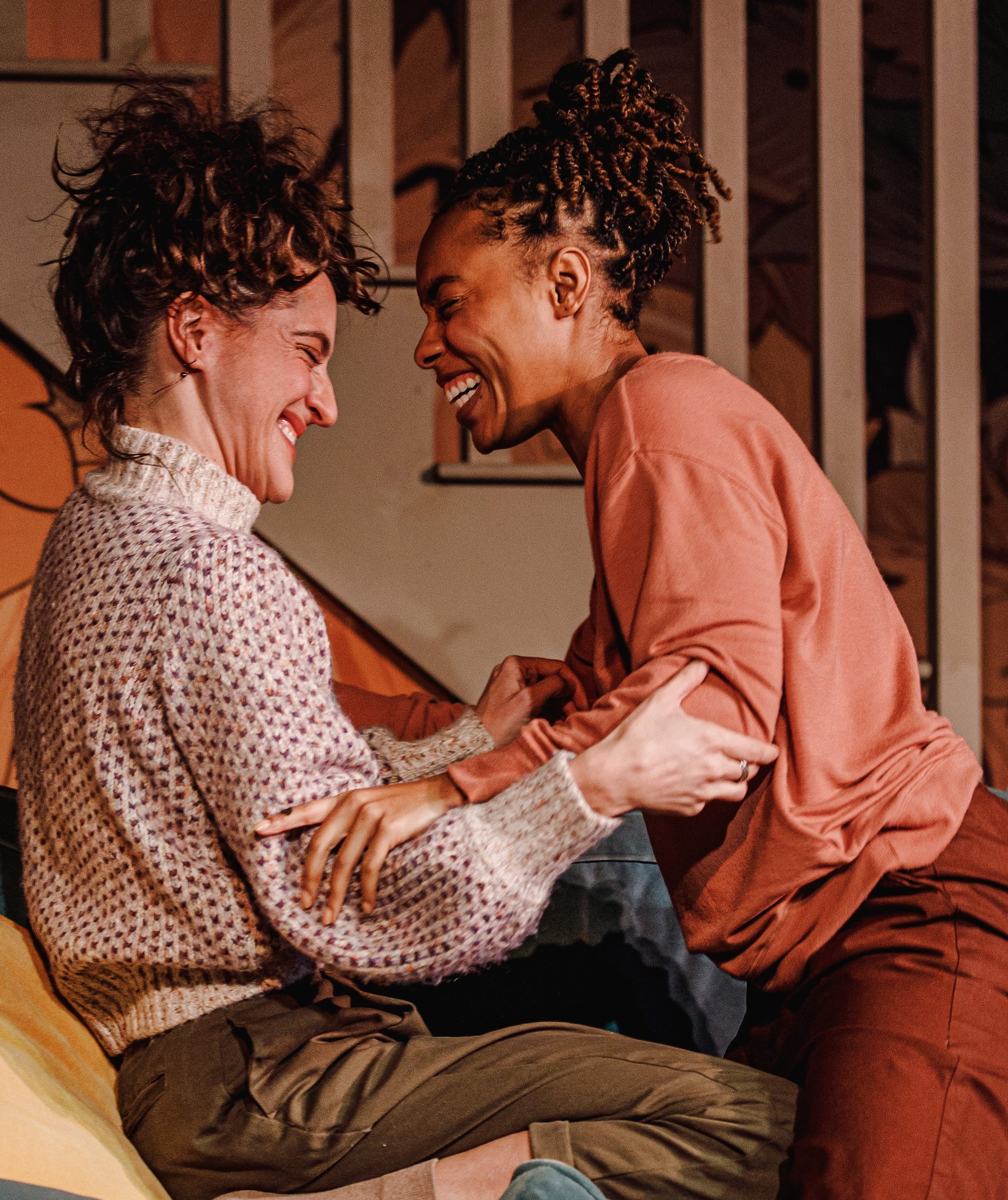Daphne (Jasmine Batchelor, right) with her partner, Winona (Keilly McQuail), in Renae Simone Jarrett’s Daphne at LCT3.
In “Ballad of a Thin Man” Bob Dylan sings, “Something is happening here, but you don’t know what it is,” a refrain that applies perfectly to Daphne (Jasmine Batchelor), the eponymous character in a new play by Renae Simone Jarrett at LCT3’s Claire Tow Theater. Something is certainly happening to Daphne, psychologically and physically, but the uncanny transformation doesn’t obey the conventional rules of time or space, and nothing may be what it seems.
The sense of foreboding, the feeling that something is off in this remote country house (designed by Maruti Evans), is established right away in the play’s wordless opening: Daphne makes tea by candlelight (eschewing a half-dozen mugs before finding one that suits her), at one point dripping hot wax onto her arm, and then suddenly realizes that her partner, Winona (Keilly McQuail), is hiding behind the curtain. “I wasn’t hiding,” Winona insists, but what else could one call it? The idea of eyes always on you, sometimes benign and sometimes malevolent, pervades the play.
Denise Burse plays a mysterious neighbor who, Winona fears, is entering both her house and her dreams.
Winona is focused on a neighbor’s house, which, she believes, is occupied by a witch who infiltrates her dreams. At this mention of it, Winona speaks half-jokingly, as the play then enters one of its stretches of quasi-naturalism, where Daphne and Winona banter like a couple. But reality is punctured again by the surreal when Winona announces it’s time to feed Phoebus, taking a mouse from the freezer and dropping it behind a sheet where it is consumed by a creature we later learn is her bird (though Daphne has never seen it).
Moments of violence that at first appear to be accidents occur: Winona slams the door on Daphne’s finger or knocks her head against a cabinet. There is a focus on blood: that which gathers under Daphne’s nail or that stains the cabinet or that soaks the tampon she removes in a bizarre gambit to win an argument with Winona. The injuries coincide with Winona becoming more and more possessive, controlling, and paranoid.
Daphne does have guests from her former life in the city, such as Piper (Jeena Yi) and her baby, but they vanish in a way that makes one wonder if they were ever actually there. Director Sarah Hughes plays with this ambiguity, particularly in transitional moments, such as Piper’s appearance being preceded by Daphne’s finding a baby in one of their cupboards, before moving seamlessly into the “normal” scene with Piper, before Piper vanishes out the window and the blanket shrouding the baby unravels, revealing nothing. Jumps in time happen lightning-fast, thanks to Stacey Derosier’s lighting design.
“There is a boldness and spirit of intellectual adventure in Jarrett’s surreal writing.”
Piper’s partner, Wendy (Naomi Lorrain), also a friend of Daphne’s, is genuinely worried about Daphne, especially after Winona returns home caked in dirt and carrying a handful of vegetables, insisting there isn’t enough food for Wendy to stay for dinner. Is this the story of an abusive relationship, and is Daphne as much a prisoner as the unseen, caged bird? What is happening to Daphne is certainly manifested in physical signs, including scars on her body that look like branches—this, along with other tree imagery and Daphne’s association with the river nearby, where she loves to swim, connect her to the mythological Daphne, a river nymph turned into a tree by Apollo. “What do you think it was like before us? When it was just trees?” Wendy asks. “Very pleasant,” Daphne responds.
The witch neighbor (Denise Burse), called Stranger in the program and script, eventually appears in the house, seemingly kind but with a cryptic manner as well. And it is Stranger who is on the stage at the end, in darkness, as a recording of Daphne’s and Winona’s voices play in a final, enigmatic exchange on violence and forgiveness.
Daphne’s friend Wendy (Naomi Lorrain) arrives at the country house for a visit. Photographs by Marc J. Franklin.
There is a boldness and spirit of intellectual adventure in Jarrett’s surreal writing and in her intention to compose a play without easy answers or conventional logic. I’m excited to see what she writes next. Batchelor’s and McQuail’s performances are finely calibrated, ably managing the radical swings in tone and the bending of reality.
There is, however, a difference between no easy answers and no answers at all, and Daphne ultimately succumbs to its pervasive mysteriousness. The production perhaps plays up the weirdness at the expense of coherence—not literal coherence, which the play doesn’t aim for, but emotional. “Something is happening here, but you don’t know what it is” is interesting for a while, but it would be nice to have something to hold on to in the end.
Daphne runs through Nov. 19 at LCT3 (150 W 65th St.). Evening performances are at 7 p.m. Monday and Wednesday–Sunday; matinees are at 2 p.m. Saturday–Sunday. Tickets are available by visiting lct.org/lct3.
Playwright: Renae Simone Jarrett
Director: Sarah Hughes
Sets: Maruti Evans
Costumes: Oana Botez
Lighting: Stacey Derosier
Sound: Sadah Espii Proctor





